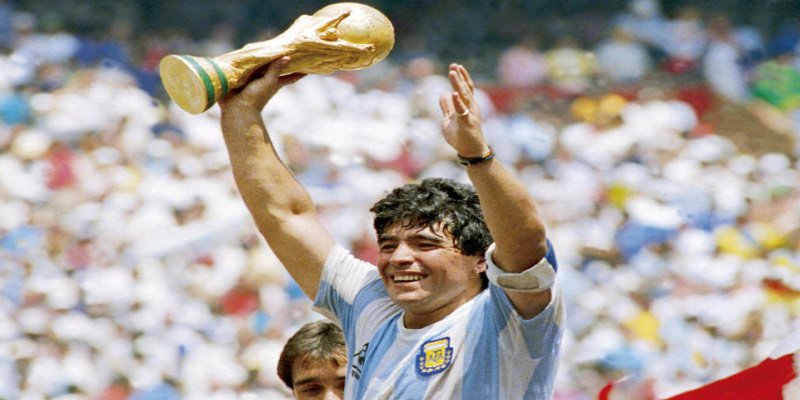Diego Maradona was more than just a footballer—he was a force of nature. From the streets of Argentina to the pinnacle of global football, his journey was one of triumph, controversy, and undying passion. A magician with the ball, a rebel against authority, and a hero to millions, Maradona’s influence stretched beyond the pitch into politics, culture, and history. His name sparks debates, admiration, and nostalgia, proving that his legend is immortal. Whether for his breathtaking goals or larger-than-life persona, Diego Maradona remains an icon unlike any other.
Key Moments in Diego Maradona’s Career
The career of Diego Maradona was punctuated by key moments that defined not only his legacy but also the history of football itself. Each event contributes to the tapestry of his life, showcasing his brilliance and the struggles he faced along the way.
The 1986 World Cup Triumph
Undoubtedly, one of the high points of Maradona’s career came during the 1986 FIFA World Cup held in Mexico. Leading the Argentine national team, Maradona produced performances for the ages, displaying unparalleled leadership and talent. His ability to carry the team on his shoulders is a testament to his greatness.
In the quarterfinal match against England, Maradona scored two of the most famous goals in football history: “The Hand of God” and the brilliant solo goal that followed. These moments encapsulated his duality as a player—capable of cunning and audacity, yet also sheer genius. The victory solidified his status as a national hero, inspiring a generation of Argentines.
The Infamous Napoli Years
Maradona’s time at Napoli is a chapter of his career that deserves special mention. When he joined the club in 1984, Napoli was struggling, but under his influence, they became a force to be reckoned with in Italian football. He led the team to two Serie A titles, a Coppa Italia, and a UEFA Cup during his tenure.
His relationship with the city of Naples was profound. He became a symbol of hope and resurgence for a region that had long been overlooked in the shadow of northern Italian clubs. The adoration from the fans was palpable, and Maradona’s connection to the city transformed Napoli into a powerhouse in European football.
The 1990 World Cup Heartbreak
While the 1986 World Cup was a celebration of Maradona’s triumph, the 1990 tournament in Italy brought heartbreak. After guiding Argentina back to the final, they faced West Germany in a rematch of the previous tournament. In a tense match that ended in controversy, Maradona’s dreams of lifting a second World Cup were dashed when Argentina fell short.
The match serves as a poignant reminder of the pressures faced by athletes at the pinnacle of their careers. It exposed the vulnerability inherent in competing at such high stakes and underscored the complexities of Maradona’s legacy—one filled with as much pain as there was glory.
Diego Maradona: The Hand of God
The phrase “Hand of God” has become inextricably linked with Diego Maradona, epitomizing his controversial and enigmatic nature. It represents a moment that will forever be etched in the annals of football history.
The Controversial Goal
During the quarterfinal match of the 1986 World Cup against England, Maradona scored a goal that he famously attributed to the “hand of God.” The incident sparked outrage among English players and fans alike. Utilizing his left hand, he nudged the ball into the net before the referee awarded the goal, despite protests.
While this act of deception drew ire, it also showcased Maradona’s cunning. In many ways, it revealed the gray areas of competition—the ethics of play—and highlighted how sports can be as unpredictable as life itself.
The Brilliant Solo Effort
Just minutes after the infamous goal, Maradona produced one of the greatest individual efforts in football history. He received the ball in his own half and embarked on a mesmerizing run that saw him evade five English defenders before scoring. This goal, often referred to as the “Goal of the Century,” demonstrated not only his extraordinary talent but also his ability to rise to the occasion.
This juxtaposition of the two goals paints a vivid picture of Maradona’s complexity—he was both flawed and brilliant, embodying the essence of what it means to be human. The “Hand of God” and “Goal of the Century” serve as contrasting symbols of his career, highlighting the duality that made him one of the most fascinating figures in sports history.
The Legacy of the Phrase
The phrase “Hand of God” has transcended its original context, becoming part of popular culture. It symbolizes the paradox of Maradona’s life—his divine gifts tempered by human flaws. Artists, writers, and filmmakers have drawn inspiration from this moment, analyzing its implications on morality, competition, and the nature of sport.
In the end, the “Hand of God” epitomizes the mythos surrounding Diego Maradona, representing the joyful chaos and unpredictability that define not only football but also life itself.

Leave a Reply